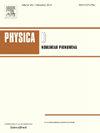Learning dynamical systems from data: A simple cross-validation perspective, part II: Nonparametric kernel flows
IF 2.7
3区 数学
Q1 MATHEMATICS, APPLIED
引用次数: 0
Abstract
In previous work, we showed that learning dynamical system Hamzi and Owhadi (2021) with kernel methods can achieve state of the art, both in terms of accuracy and complexity, for predicting climate/weather time series Hamzi et al., (2021) as well as for a family of 133 chaotic systems Lu et al., (2023), Yang et al., (2024), when the kernel is also learned from data. While the kernels considered in previous work were parametric, in this follow-up paper, we test a non-parametric approach and tune warping kernels (with kernel flows, a variant of cross-validation) for learning prototypical dynamical systems. We train the kernel using the regression relative error between two interpolants (measured in the RKHS norm of the kernel) as the quantity to minimize, as well as using the Maximum Mean Discrepancy between two different samples, and that characterizes the statistical properties of the dynamical system, as a the quantity to minimize.
从数据中学习动态系统:一个简单的交叉验证观点,第二部分:非参数核流
在之前的工作中,我们表明,当核也从数据中学习时,用核方法学习动力系统Hamzi和Owhadi(2021)在预测气候/天气时间序列Hamzi等人(2021)以及由133个混沌系统Lu等人(2023),Yang等人(2024)的准确性和复杂性方面都可以达到最先进的水平。虽然在之前的工作中考虑的核是参数化的,但在这篇后续论文中,我们测试了一种非参数化方法和调谐翘曲核(带有核流,交叉验证的一种变体),用于学习原型动力系统。我们使用两个插值变量之间的回归相对误差(在核的RKHS范数中测量)作为最小化的量来训练核,以及使用两个不同样本之间的最大平均差异作为最小化的量,并且表征了动力系统的统计特性。
本文章由计算机程序翻译,如有差异,请以英文原文为准。
求助全文
约1分钟内获得全文
求助全文
来源期刊

Physica D: Nonlinear Phenomena
物理-物理:数学物理
CiteScore
7.30
自引率
7.50%
发文量
213
审稿时长
65 days
期刊介绍:
Physica D (Nonlinear Phenomena) publishes research and review articles reporting on experimental and theoretical works, techniques and ideas that advance the understanding of nonlinear phenomena. Topics encompass wave motion in physical, chemical and biological systems; physical or biological phenomena governed by nonlinear field equations, including hydrodynamics and turbulence; pattern formation and cooperative phenomena; instability, bifurcations, chaos, and space-time disorder; integrable/Hamiltonian systems; asymptotic analysis and, more generally, mathematical methods for nonlinear systems.
 求助内容:
求助内容: 应助结果提醒方式:
应助结果提醒方式:


